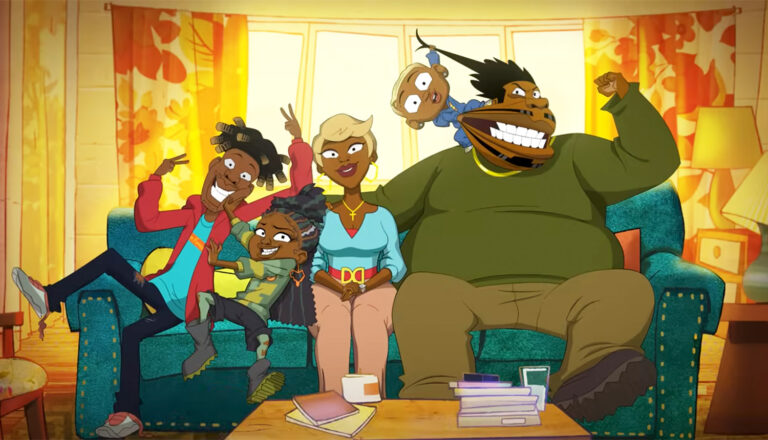
Good Times
Netflix takes a classic sitcom, Good Times, and turns it into a vulgar, violent, sexually-charged TV-MA show.

Good cop, bad cop? How ’bout good cop, crazy cop?
It’s not that Martin Riggs is completely daffy, of course. It’s hard to be an effective police officer if you also believe that you’re the rightful king of Freedonia or that aliens are stalking your every move (Fox Mulder excepted, of course). It’s just that ever since his wife died, Riggs has had a lingering compulsion to join her. And let’s not forget his anger management issues, with much of his rage directed at his incarcerated father. Not the sort of man who should have access to guns, perhaps, much less carry one around as part of his job.
But Riggs doesn’t want to pull the trigger himself. No, he’d much rather get someone else to do it for him. He figures the more danger he gets himself into, the more likely he’ll go out in a blaze of glory. The more wisecracks he can voice at inopportune times—the more he can get under a criminal’s skin, in other words—the more inclined said criminal might be to put Riggs out of both of their miseries.
And if they don’t do the deed, well, maybe Riggs’ partner will.
Partner Roger Murtaugh, frankly, doesn’t need the aggravation. Unlike Riggs, he’s got a life. He’s got a family. He’s got high blood pressure, for cryin’ out loud. The last thing Murtaugh needs is a partner whose idea of a good day’s work is dashing into a spray of bullets, walking up to an 8-foot-6 drug lord, poking him in the chest and calling him “Tiny.”
But for all Riggs’ faults, Murtaugh can see the guy is a good detective. His methods may be generally called “unorthodox” (or, less charitably, “all kinds of insane”), but in their time together, the two of them have already hauled killers, creeps and kingpins to justice. Plus, Murtaugh might be the closest thing to family that Riggs has. Riggs may be a loose cannon in Murtaugh’s world, but maybe Murtaugh can be a stabilizing influence in Riggs’.
And if not … well, given Riggs’ penchant for quippy one-liners, at least Murtaugh will likely die laughing.
Buddy-cop comedy capers and suicidal tendencies would seem to be fairly disparate elements to mix. Suicide is not a laughing matter, no matter how many one-liners lurk around the edges. But that didn’t stop the original Lethal Weapon movie, released in 1987, from becoming a big hit and sending star Mel Gibson into the Hollywood stratosphere.
The original movie and its three sequels were all rated R. Fox’s television remake doesn’t have the blood or language of its cinematic forebears. Indeed, the show feels much of a kind with today’s other action-oriented broadcast cop shows remakes: Hawaii Five-0, for instance, or MacGyver or CBS’s cancelled Rush Hour.
But that’s not to say that Lethal Weapon is clean TV. Language can be rough. People are killed and unearthed just about every episode. It’s not uncommon to see scantily clad men and women cross the television camera. And Riggs has a tendency to dream about his dearly departed beloved—often taking a shower and asking him to join her. (Nothing critical is shown, but these reveries do involve lots of skin and are, by their nature, suggestive and sensual.)
And then there’s Riggs’ penchant for breaking the law in his addled quest to protect it. Sure, I get that his recklessness is both part of the show’s setup and its subsequent attraction. But Lethal Weapon’s central conceit has a downside: It suggests that laws can and should be broken if the payoff is big enough. That’s a problematic stance at any time, and particularly now, when much of the public is demanding more accountability from police, not less.
For 16 years, Murtaugh has been hunting a contract killer named Frankie. But when Murtaugh discovers a murder that bears all the tell-tale signs of his archnemesis, he suspects that Frankie’s being framed.
A frenetic shootout leaves several people apparently dead (one of whom is cut down in a spray of blood). Another guy (who’s duct-taped to a chair) gets shot in the gut, his blood-covered hands resting on the wound. Riggs and Murtaugh see that he’ll bleed out if they don’t do something. (They do, but he expires anyway.) Someone is incapacitated after a flare gun is fired at something, causing an explosion (and tossing the person through the air). We see dead bodies and photos of several of Frankie’s alleged victims, many of them sporting an obvious (albeit small) bullet wound to the forehead. (Frankie’s trademark was a shot to the head and stomach, and we see some of his victims with bloody wounds to the abdomen as well.)
In prison, Riggs’ father hits someone over the head with a telephone receiver, knees someone else in the stomach and kicks both when they’re down. (Both were threatening Riggs’ father, and one carried a makeshift blade.) Later, the would-be assailants succeed in attacking the father: We later see him in an infirmary bed, and the doctor says that he was stabbed several times.
While teaching his 16-year-old daughter how to drive, Murtaugh paints a verbal picture of the terrible things that can happen to her if she doesn’t watch the road carefully. Murtaugh himself has a painful encounter with hot soup.
A man urinates in front of Murtaugh, and there’s much related discussion about urologists and urinary conditions. A reference is made to constipation. Frankie leaves several cigarette butts at crime scenes (though we don’t see him actual smoke), and he mentions that his doctor has made him give up drinking. One of Frankie’s alleged victims allegedly spent ill-gotten cash on cocaine and gambling. Someone describes Riggs’ and Murtaugh’s banter as “sexual tension.” Characters say “d–n” three times, “h—” four times and “crap” once. We also hear a reference to someone who’s describes as an “S.O.B.”
A murder investigation leads Murtaugh and Riggs toward a money laundering scheme. But it also forces them to cross paths with the Federal Drug Enforcement Agency—and the agent in charge doesn’t appreciate their input one bit.
A killer shoots two people in the forehead: One murder is accompanied with a splash of blood against a mirror. The body is later discovered in an alley. We see the wound in his head and learn that someone broke the corpse’s legs in order to fit it in a suitcase. Someone tortures Riggs, repeatedly forcing the cop’s head into a tub of water in the hopes of making him talk. (He doesn’t.)
A woman wears a revealing bikini on a beach. There’s a reference to bleaching pubic hair. Riggs repeatedly dreams of his wife taking a shower. Nothing critical is shown on camera, but the wife suggestively asks Riggs to join her, and he does (fully clothed). For Riggs, it feels like an invitation to kill himself to “join her.”
“Is that what you want?” his counselor asks.
“Some days,” he says, then amends himself. “Most days. Every day.”
Riggs and an evildoer get into a fight: The bad guy clocks Riggs with a piece of wood and nearly shoots the detective. Riggs hangs on a chain suspended from the top of a moving truck: The driver’s movements cause Riggs to crash into the truck’s sides. Bad guys fire weapons into cars, though no one gets hurt. White residue is found underneath the fingernails of a dead man: Murtaugh suspects it’s cocaine, but it’s not. A bottle of whiskey sits in Riggs’ trailer. Murtaugh is hoping to have a “bender” while his wife’s away—really just hoping that he can play poker and drink a few beers with his friends. (They never show, and he and Riggs pop open a couple of brews instead.)


Paul Asay has been part of the Plugged In staff since 2007, watching and reviewing roughly 15 quintillion movies and television shows. He’s written for a number of other publications, too, including Time, The Washington Post and Christianity Today. The author of several books, Paul loves to find spirituality in unexpected places, including popular entertainment, and he loves all things superhero. His vices include James Bond films, Mountain Dew and terrible B-grade movies. He’s married, has two children and a neurotic dog, runs marathons on occasion and hopes to someday own his own tuxedo. Feel free to follow him on Twitter @AsayPaul.

Netflix takes a classic sitcom, Good Times, and turns it into a vulgar, violent, sexually-charged TV-MA show.

While its protagonist might live a nuanced life, The Sympathizer’s problematic content can’t be described the same way.

Say hola once again to the iconic explorer in this faithful reboot of the children’s series.

Based on a popular video game, Ark: The Animated Series features hungry dinosaurs, bloodthirsty people and plenty of problems.